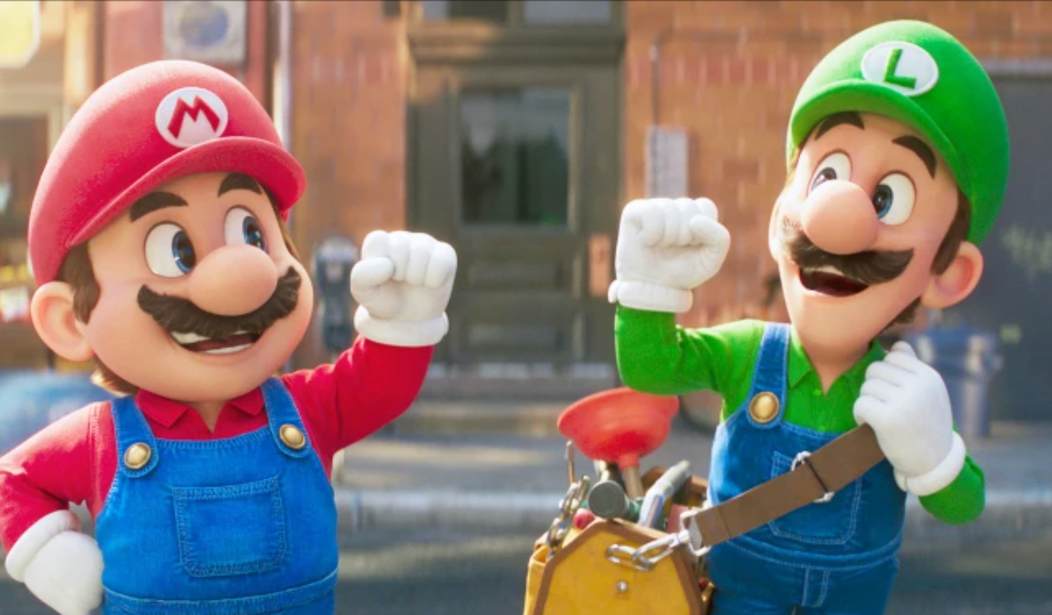The new Super Mario Bros. Movie remains a box office juggernaut and is expected to cross $1 billion this year, outperforming several hits from Disney/Pixar.
Conservative pundits have praised the success of the animated movie, attributing it to its being “anti-woke.” My family went to see it on opening night, and everyone in the packed theatre loved it. The film, which was put out by Illumination (not Disney) did not lecture the audience about global warming, feature gender or race swaps, or include token LGBTQ characters.
The film’s plot revolves around Mario and Luigi, two plumbers from Brooklyn trying to promote their new business, and their attempt to respond to a plumbing emergency results in their unintentional transport to the Mushroom Kingdom. Subsequently, Mario and Luigi become separated, with Luigi ending up in the Bowser-controlled Dark Land while Mario finds himself in the Mushroom Kingdom, which Bowser is intent on seizing control of. With the assistance of his new ally Toad, Mario seeks help from Princess Peach to rescue his brother.
Spencer Klavan argues at the Washington Examiner that the film is indeed woke because it ditched the damsel in distress trope. “Because love it or hate it, Super Mario Bros. entirely rewrites the basic plot of the original video games. That plot is extremely simple: A beautiful princess is locked away by an evil dragon (technically a turtle, but that’s a separate online debate). You, an Italian plumber, must conquer the dragon’s minions (also turtles) in their castles,” he writes.
If you set out to make the definitive movie version of these games, the obvious choice would be to tell that story. But the creators of Super Mario Bros. bent over backward to avoid putting the classic version on screen. Mario’s motivations and relationships are thoroughly reimagined: He has to team up with Peach (Anya Taylor-Joy) to save his brother Luigi (Charlie Day). Peach becomes the indomitable fighter who smuggles a weapon into the midst of Bowser’s henchmen even when she (very briefly) consents to be kidnapped. “She can do anything!” says her sidekick Toad, flexing a tiny muscle.
He wasn’t the only one who took issue with the storyline. During a recent episode of the Wrongthink podcast, Anna Perez, a conservative host, accused the film of attempting to “brainwash” young girls into becoming feminists by depicting Princess Peach as a strong protagonist unafraid to assume leadership. “What they are doing is they’re trying to brainwash society into thinking that’s how young girls are supposed to be. And this is dangerous because then we have women who go out there and think they’re men, and they wind up getting hurt. They wind up getting raped,” she said. “The reality is this has actual ramifications on society. Young women see stuff like this, and this brainwashes them to be a feminist…”
Does it really? Is it really “woke” to suggest that a female character must not be a damsel in distress? While I would argue that Princess Peach does tend to embody the Mary Sue trope, Mario finds it challenging to adjust to the unusual characteristics of the Mushroom Kingdom, such as the floating blocks and power-ups. But her expertise with the intricacies and peculiarities of the Mushroom Kingdom is due to the fact that she has been there since childhood. Ultimately, Mario remains the protagonist of the film and is the one who must confront Bowser to rescue the Mushroom Kingdom.
Strong female characters have existed in cinema for decades. Moreover, when right-leaning pundits label a movie as “woke” solely because it portrays a female character in a heroic fashion instead of as a victim, it contributes to negative stereotypes of conservatives. It’s not like this has been a problem for conservatives before, as for years, they pointed to Ellen Ripley in the Alien franchise or Sarah Conner in the Terminator franchise as positive examples of strong female characters in film. Wokeness in Hollywood is a problem, but conservatives shouldn’t be afraid when a movie doesn’t rely on the damsel in distress trope.










